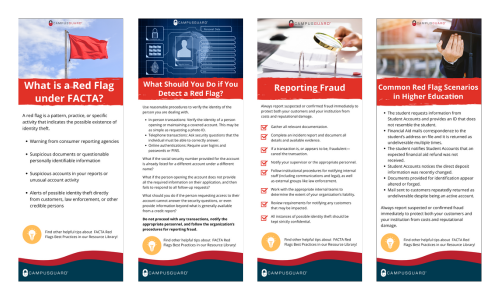FACTA Course Description
The course provides an overview of the Fair and Accurate Credit Transactions Act (FACTA) and the associated Red Flags Rule.
- Target Audience: All staff interacting with consumer data and covered accounts
- Course Length: 35 minutes
FACTA Course Learning Objectives
CampusGuard’s FACTA Red Flags training course reviews common risks and threats to covered accounts and how specific departments within your campus are impacted.

FACTA Course Modules
Our FACTA course is designed with micro-learning modules, making the content easier to retain. This course is designed to help your organization and staff prevent fraud by proactively identifying potential warning signs of identity theft.
-
FACTA Red Flags Overview
This module covers identity theft and the potential consequences that can follow, provides an overview of FACTA and the associated Red Flags Rule, explains how various departments and third parties may be involved, and discusses covered accounts protected by the program. -
Identifying and Responding to Red Flags
This module covers strategies for identifying and detecting potential fraud, raising employee awareness of suspicious information and activities, how to handle notices or alerts of identity theft, and response procedures for responding to red flag incidents, and best practices for protecting sensitive data.
 Explore our other courses
Explore our other courses
Explore our full course library to find training that fits your needs, from security awareness and compliance essentials to specialized topics designed to support your role and responsibilities. Whether you’re looking to strengthen your cybersecurity posture, stay up to date with industry regulations, or broaden your knowledge, we’ve got you covered.
The Latest FACTA Course Updates
We update all courses annually to reflect evolving risks and requirements. The latest updates to the training modules include:
- Current statistics on consumer fraud and identity theft
- Examples of Artificial Intelligence (AI) fraud
- Synthetic identity theft
- Reportable vs. recordable identity theft events
- Notifications of identity theft from other individuals
- How to handle suspicious medical information
- FACTA in Higher Education and covered accounts
- Real-world scenarios and lessons learned
- Updated graphics
Access Our Resource Library and Threat Intel News
All FACTA Course users also have access to our Resource Library, which offers supplemental materials that support the course content.
Our Threat Intel Briefing newsletter is sent directly to your inbox twice a month, and features the latest cyber threats, cyber crimes, and vulnerabilities happening now around the globe.

Related Products and Services
Protecting Credit Information Starts with FACTA Awareness
CampusGuard’s FACTA training helps employees understand how to handle consumer credit information securely, detect identity theft red flags, and properly dispose of sensitive data. By staying compliant, organizations reduce legal risks, protect their reputation, and build customer trust.
FACTA Training Frequently Asked Questions
The Fair and Accurate Credit Transactions Act (FACTA) is a U.S. federal law designed to help reduce identity theft and protect consumer credit information. It gives consumers rights regarding their credit data and imposes obligations on organizations to safeguard that data.
Employees who handle consumer financial information, credit reports, or sensitive personal data, including banking, lending, higher education, retail, healthcare, and service industries, should complete FACTA training.
The Red Flags Rule requires organizations to develop and implement a written Identity Theft Prevention Program to detect, prevent, and mitigate identity theft.
Personally Identifiable Information (PII) and credit-related data, such as Social Security numbers, financial account numbers, driver’s license details, and credit reports, are all covered under FACTA.
Typically, training is required upon hire and refreshed annually, though frequency may vary based on organizational policy and regulatory updates.
Yes. FACTA applies to all formats of consumer information, both physical records and electronic data.
FACTA complements laws such as GLBA, HIPAA, and state privacy regulations, but it specifically focuses on consumer credit information and identity theft prevention.

